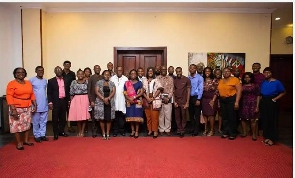Stakeholders in Ghana’s educational sector are calling on the Government to explore more innovative and long-term financing options for all the pre-tertiary levels including kindergarten, primary, junior, and senior high schools.
They asked the government to implement improved public-private partnership finance methods into pre-tertiary education rather than relying on oil earnings, which are unstable, to fund initiatives like the Free Senior School (Free SHS).
The stakeholders also called for an integration of Technical and Vocational Education and Training (TVET) into mainstream education, especially at the primary, junior high and senior high schools.
Made up of Teacher Unions, Civil Society Organisations (CSOs), and policy watchers, the stakeholders said, a sustainable financing system and effective monitoring and accountability.
When sustainable financing was used, they added, Ghana would have a higher standard of education and create more graduates who are prepared for the labour market even before they reach tertiary institutions.
They said this at a technical consultation on education as part of processes to develop a compact for Ghana’s political and economic transformation, aimed at achieving “the future we want” by 2050, organised by the African Centre for Economic Transformation (ACET).
During a panel discussion, Kofi Asare, the Executive Director of Africa Education Watch, called for increased budgetary allocation to pre-tertiary education from the current three per cent of Gross Domestic Product (GDP).
He also urged the Government to ensure that there was financial resource availability, efficiency, and equitable distribution at all pre-tertiary educational levels across the country.
Kofi Asare noted that Ghana’s present educational system made spending on the 25 per cent rich, three times higher than the expenditure on the 25 per cent of poor people and called for urgent actions to change the situation.
Madam Gifty Volimkarime, Country Representative, Crossroads International, also underscored the need to a rethink of Ghana’s financing module for pre-tertiary education by exploring public-private partnerships.
She said it was also important for all stakeholders to join forces in making sure that the monitoring of resource utilisation and budgetary allocation was strengthened at all levels of pre-tertiary education.
Dr Kingsley Amoako, Founder and President, of ACET, said, with more than one-third of Ghana’s population being youthful, it was important to give the youth critical thinking, leadership, problem-solving and innovative skills through quality education.
He said Ghana would be suitably positioned to supply well-educated and skilled workers for the job market to help reap the demographic dividend and boost economic growth if free, decentralised, and inclusive quality basic education was made accessible to those who needed it.
Additionally, free SHS and TVET should be made sustainable in terms of financing, and equitable for girls and people with special needs, while strengthening teacher training programmes.
General News of Friday, 10 March 2023
Source: GNA

















